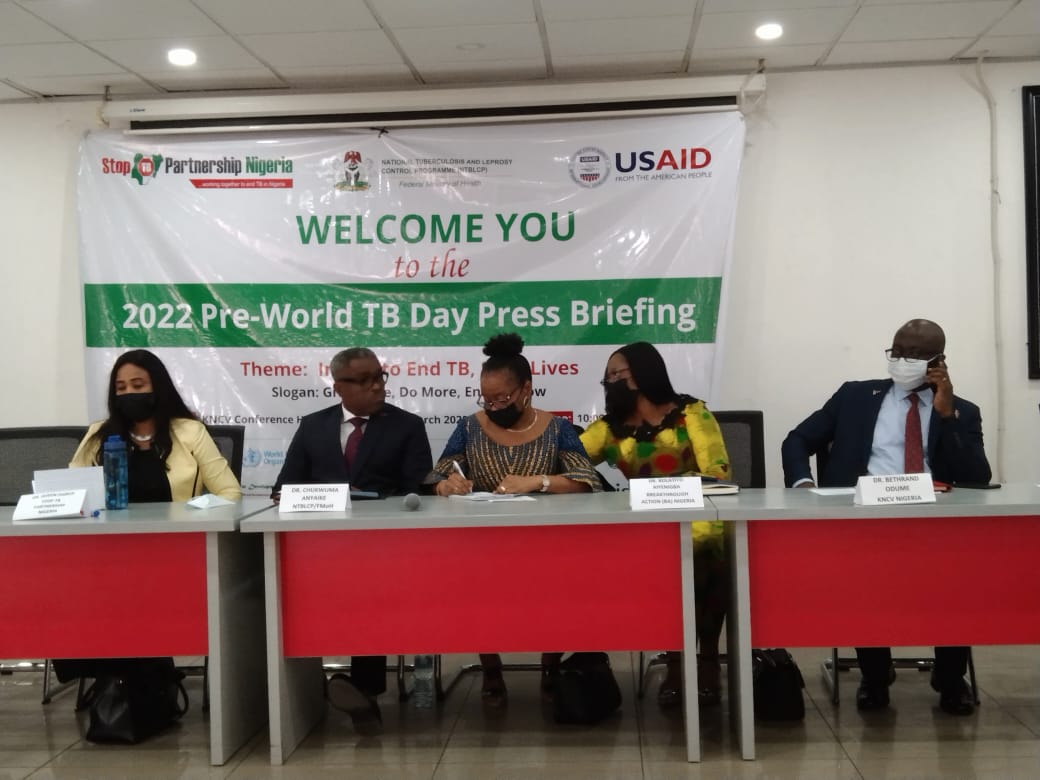Health
18 People Die Every Hour of TB….with 50% Increase in TB Notification in 2021

By Laide Akinboade, Abuja
Stop TB Partnership Nigeria, on Thursday revealed that 18 people die every hour of Tuberculosis, TB. Acting Board Chairman , Stop TB Partnership, Queen Ogbuiji, revealed this at 2022 pre- world TB Day press briefing organized by Stop TB Partnership Nigeria, in Abuja.
She also said there is 50% increase in TB notification from 138,591 TB cases in 2020 to 207,785 TB cases in 2021.
She said it is imperative for the Federal Government and stakeholders to increase funding for TB treatment.
The theme for 2022, ‘Invest to end TB. Save lives’. And the slogan for Nigeria is ‘Give more, Do more, End TB now’.
She said, “Nigeria is among the 30 high burden countries for TB, TB)HIV and MDR-TB. Nigeria is ranked 6th among 30 high TB burden countries globally and first in Africa. Nigeria account for 12% of the global gap between TB incidence and notified cases.
“Out of 452,000 estimated new TB cases in Nigeria in 2020 only 138, 591 were notified to National Tuberculosis and Leprosy Control Programme (NTBLCP), with 30% treatment coverage. The country also recorded a 50% increase in TB notification from 138,591 TB cases in 2020 to 207,785 TB cases in 2021.
“Only 6% of all forms of notified TB cases in 2021 are children less than 15 years. Of an estimated 21,000 Dr-TB cases recorded in 2020 , only 2,061 (10%), were diagnostic services. An estimated 18 people per hour die of TB-related disease, that is 432 every day and over 156,000 every year”.
She lamented that about 1.9 billion people is infected with TB, that is a quarter of the world population. And annually, 10 million people develop TB, of them about 1.1 million are children and 860,000 people living with HIV are infected.
She also stated that 3 million people miss out of TB and only 1 in 3 people with DR-TB is able to receive treatment.
Ogbuiji, therefore urged stakeholders and government to increase funding for TB, “More investment to TB will save millions more lives and accelerate the end of th TB epidemic. The Stop TB Partnership and all partners are calling on all those involved in the fight against TB to unite under this overarching theme and sound the alarm that the low levels of funding for the TB response year after year cannot continue nor be accepted anymore.
Globally the US$15 billion annual funding for TB promises by world leaders at UNHLM in 2018, less than half has been delivered. And in Nigeria of the $373 million needed for TB control in Nigeria I year 2020, only 31% was available to all implementers of TB control activities in Nigeria (7% domestic and 24% donor funds) with 69% funding gap”, she said.
She therefore stress the need for all hands to be on desks in order to increase funding hence save lives and end TB 2030.
World Health Organization, WHO, Country Representative, Walter Mulombo, who was represented at the occasion by Amos Omoniyi, commended the Nigeria for making a significant progress but added that it is imperative to increase investment in TB response. And also create more awareness on TB.
He also reiterated the commitment of the agency in supporting Nigeria on the fight against TB.
Health
Int’l Day of Boychild: EFCC, Others Decry Impact of Cybercrime on Youth’s Mental Health

By David, Torough Abuja
The Economic and Financial Crimes Commission (EFCC) and various stakeholders have raised the alarm over the detrimental effects of cybercrime on the mental health of young boys in the society.
This was noted during the annual essay competition organized by the Great Achievers Initiative for Youth and Community Development (GAIYD) in Abuja.
The event, held in celebration of the International Day of the Boy Child 2025, focused on the theme “Boy’s Health and Wellbeing” and the essay topic, “Where are the Mentors? The Missing Role Models for Boy’s Growth and Development.
”The Chairman, Economic and Financial Crime Commission (EFCC), Ola Olukoyede, who was represented by the Commission’s head of Enlightenment and Reorientation, Aisha Muhammad, emphasized the urgent need for integrity and guidance among youth.
“Girls are just there for the enjoyment, either the boyfriends or the wives, and that’s it. They are just there as a supporters club, so the boys are the ones doing this,” she stated.
Olukoyede explained that the EFCC has established integrity clubs in primary and secondary schools to instill ethical values.
“We have zero tolerance clubs in the tertiary institutions, trying to catch them young, to instill the spirit of integrity and talk to them about what they should know, what they shouldn’t do,” he added.
The discussion highlighted the pervasive threat of cybercrime, which poses significant risks to the mental health of young boys.
The EFCC Chairman warned that cybercrime can lead to anxiety, depression, and stress.
“The issue of mental health and well-being of the male child is crucial and it is at the heart of the 2025 International Day of the Boy Child Celebration.
“The weight of secrecy, fear of detection, and potential prosecution can be overwhelming,” he cautioned.
Olukoyede therefore called for collective responsibility from parents, educators, and mentors to guide young people towards positive alternatives and foster digital literacy.
Also speaking, the wife of Ooni of Ife, Her Regal Majesty, Olori Temitope Enitan Ogunwusi, addressed the gathering, urging stakeholders to be proactive in supporting boys.
The Olori emphasized the importance of being a voice for boys. She challenged adults to reflect on their roles in nurturing boys.
“Who is going to be the voice for our boys? As a mentor, as a parent, as a guardian, are you a voice for your boy or for your boys? How have you been a voice for that boy child? For that son that you birthed?,” Ogunwusi queried.
The Olori further encouraged boys to recognize their potential and urged parents to be positive role models, emphasizing that the responsibility of raising boys falls on the entire community.
“You have God’s kind of mind. Everything that determines your future is right here in your head.”
The Keynote speaker at the event, Kayode Adaramodu addressed the critical issue of mental health, emphasizing the importance of healthy habits and open communication.
“You need to sleep well. Sleeping is very, very important. Exercising is very important. Open communication, developing open skills, positive information, embracing the good side of social media. Learning, connecting with people, and having opportunities to express yourself. These are good ways of promoting your mental well-being,” Adaramodu urged.
He therefore encouraged boys to seek professional help when needed and to utilize mental health resources available to them.
“And you can also find professional help and resources. Psychologists are there. These are people who study human behavior, the way we think, the way we feel.
“The same way you have WhatsApp, the same way you have Facebook, TikTok, and other things like that, for entertainment. To also take care of your mental health related issues, there are apps out there that can help you to become mentally alert and resourceful,” he said.
Speaking earlier, the Founder of GAIYD, Dr. Hillary Akpua, noted the need for a dedicated focus on the boy child and expressed gratitude for the growing advocacy for boys.
“If you have not been paying attention to your boys, please start doing so. Send them for training where they can develop more because the girls you are training today might meet the boy you left untrained tomorrow. I’m sure you won’t want that girl you are busy training today to marry such an untrained boy.
“In order word, for the efforts we put into raising our female children not to be counterproductive eventually, we really need to do better in raising these young men God has blessed us with,” Akpua said.
The highlight of the event was the official launch of One Boy One Skill Project by Olori Temitope Enitan Ogunwusi. The project is aimed at engaging young male adults in different vacations to empower for the future ahead.
Also, there was presentation of prizes to winners of the essay competition.
While the first position received a scholarship worth 150,000 Naira, the second position was awarded 100,000 Naira, and the third position received 50,000 Naira.
Additionally, consolation prizes were provided for runners-up and sponsored gifts for all participants.”
GAIYD, a non-governmental organization dedicated to community and human development, places special emphasis on the growth and empowerment of the male child.
Health
FG Promises Access To Eye Care For Every Nigerian

Dr Iziaq Salako, the Minister of State for Health and Social Welfare says the Federal Government will ensure that every Nigerian has access to the eye care they need.
Salako said this in Abuja on Thursday at the Eyeball Summit organized by the Optometrists and Dispensing Opticians Registration Board of Nigeria (ODORBN).
The summit’s theme was “Shaping the Future of Eye Care in Nigeria: Strengthening Systems Through Strategic Alliances”.
According to Salako, the theme is quite apt and aligns with the ministry’s current line of investment in the health sector.
He said that it also aligned with the overall goal of the Renewed Hope Agenda to ensure that Nigerians are provided with the healthcare they need at any point in time without financial hardship.
He said that in the face of rising challenges, such as the increasing burden of visual impairment and the growing demand for eye care services, the ministry may not address the issue of eye health in isolation.
“By working together, we can ensure that every Nigerian, regardless of their geographical location or economic status, has access to the eye care they need.
“This summit serves as an important platform to collectively strategise and propose concrete solutions that can strengthen the eye care system in Nigeria.
“It can not be optimally productive without strategic alliances, collaboration and cooperation.
“It is through partnerships that we can pool resources, share expertise and develop innovative solutions to overcome the gaps in eye care provision,” Salako said .
According to him, it will include increasing awareness about the importance of regular eye check-ups, ensuring that the necessary infrastructure and human resources are in place to support the delivery of services.
He said that the partnership would also promote eye health friendly policies and provide continuous professional development training to ensure that eye health care givers are up to date in their knowledge and skills.
“The government is committed to ensuring that you have the necessary tools, policies, and an enabling environment to carry out your work effectively.
“Under this administration, we will continue to expand access to affordable eye care services, which are critical in a country where a large proportion of the population live in underserved areas,” he said.
Dr Obinna Awiaka, Registrar of the board, said that the summit was, a testament to their collective commitment, resilience, and aspiration.
Awiaka said that it symbolised the board’s relentless pursuit of excellence, the prioritisation of knowledge, innovation, partnership, and an unyielding devotion to preserving and enhancing the gift of sight for all Nigerians.
According to him, in an era marked by rapid technological change, shifting patient needs, and complex healthcare challenges, it is imperative that the custodians of vision health, stay ahead of the curve.
“We must constantly evolve, embracing innovation while upholding the highest ethical and professional standards.
“The theme speaks to a fundamental truth: No single entity, no matter how skilled or committed, can achieve transformative change alone,” he said.(NAN)
Health
FG Pledges Mentorship, Leadership Support For Boy Child

The Ministry of Youth Development has reaffirmed its commitment to creating platforms that promote mentorship and leadership development for the boy child.
Mr Ayodele Olawande, Minister of Youth Development, said this on Friday in Abuja during a news conference to commemorate the International Day of the Boy Child.
The day is marked annually on May 16, with the 2025 theme, “Boys’ Mental Health and Well-being.
”Olawande stated that the government believed every boy, regardless of background or economic status, deserved quality mentorship to help him thrive.
“As a government, we are committed to creating platforms that promote mentorship and leadership development for the boy child.
Through initiatives like this, we can provide them with the support they need to succeed,” he said.The minister emphasised that the goal was to empower Nigerian youth, including boys, with the skills, knowledge, and opportunities necessary for success.
“In today’s world, many fathers have little time for their children, especially their sons. This can negatively impact their development and well-being,” Olawande noted.
He stressed the importance of mentorship in filling that gap: “Without positive male role models, many boys struggle to develop the skills and values needed to become responsible, productive members of society.”
He added that mentorship offered guidance, support, and helped boys build self-confidence, make sound decisions, and form positive relationships with adults.
Olawande also acknowledged the United Nations for recognizing the significance of supporting boys through mentorship, saying the International Day of the Boy Child reflected global commitment to promote their well-being and development.(NAN)

















